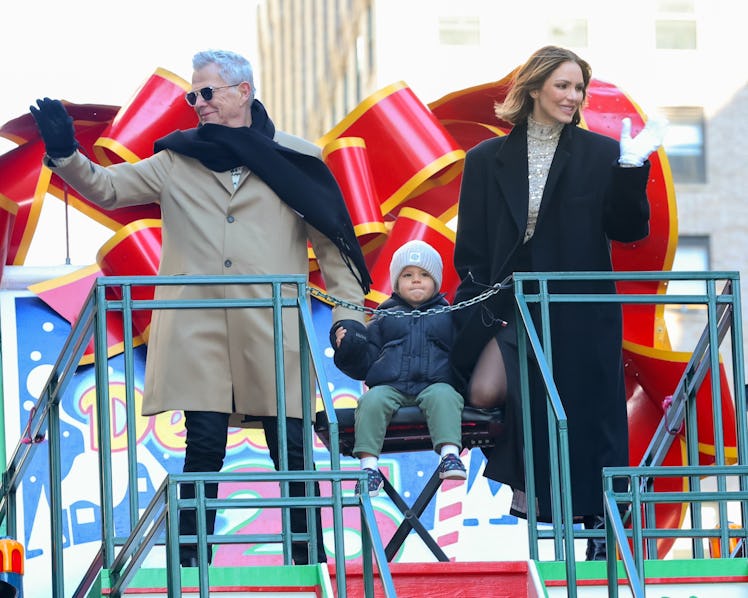This Famous Power Couple Has One Question: How Do You Discipline A Toddler?
Celebrity parents: they have the same discipline arguments as us!

In a recent interview, celebrity couple Katharine McPhee and David Foster aired out a household debate they’ve been having regarding when to discipline their two-year-old toddler Rennie — and boy, is it relatable.
"I want to start disciplining [Rennie], and Kat's not really down with that," Foster recently told People.
"No, that's not true," McPhee responded. "I just want to discipline in my own way. There's the more old-fashioned way of disciplining which involves time-outs and things like that. My take is that you can have more mindful parenting as opposed to just assuming that a two or three-year-old can have time alone to reflect on what they've done poorly.”
This back and forth is likely familiar to any parent. The question of how to discipline toddlers is an internal (and external) debate most moms and dads face while confounded by the irrational behavior and mood swings of young children. What does our discipline style look like? How can we be consistent? When should we start? The topic is complex and multilayered, and discussions involve everything from personal valus to the pros and cons of different parenting styles — the latter of which is especially of concern when those differences may be generational.
Foster, 74, has already raised five adult children and is 34 years older than McPhee — literally a generational age difference. In and of itself, that’s not necessarily a big deal. But in light of current research and cultural norms, many parents similar in age to 39-year-old McPhee are moving away from the harsh and inflexible parenting tactics that older generations experienced as kids and practiced on their own children.
Foster is one of those older parents. McPhee put it this way: "David's more results-based. He's like, 'He can't just walk by and swat people,” says McPhee, referring to Rennie. "Of course not. But he's two and a half and he's learning those things. It's just a different approach. I think his era of parenting is different than mine."
In Foster’s defense, he’s probably seen times when the pendulum has swung from the authoritarian-style parenting that defined his generation to a more permissive style where entitled kids are allowed to walk all over their parents. But there are plenty of folks calling out that type of jellyfish parenting and advocating for a more authoritative parenting style that seeks to balance healthy boundaries with emotional presence.
The transition toward more positive discipline models is at least partially rooted in a better understanding of cognitive development and also grounded in a deeper understanding of social-emotional learning.
So, in the case of a misbehaving toddler — perhaps one walking by and swatting people — what does discipline that works actually look like?
Some of the most helpful practical advice comes from the American Academy of Pediatrics guide “10 Tips for Preventing Aggressive Toddler Behavior,” which includes child-focused and parent-focused strategies. It offers clarity between the differences in discipline and punishment and advice such as “until age three and sometimes later, children simply don’t understand the concept of punishment. Setting limits is a much better approach than punishment; most children will respond to clear, calm, and decisive limit-setting.”
Perhaps frustratingly to McPhee and Foster, neither of them is entirely wrong about how to approach discipline for little ones. (We should know — we’ve almost written the book on it.) Timeouts — perhaps one of the most popular versions of limit setting and/or punishment — can be helpful or harmful, depending on how they are implemented.
According to previous reporting from Fatherly anger, lecturing, yelling, excessively long timeouts, and a lack of reconciliation at the end of the timeout undercut their effectiveness. But a calmly implemented timeout can break the tension of a chaotic moment, and create space to calmly discuss why a child’s actions were hurtful or wrong and give them a chance at a re-do.
Like the rest of us, McPhee and Foster seem to be figuring it out as they go. But one indication they are on the right track — besides the fact that they are openly discussing their different approaches to parenting — is that they seem to have a grasp of the big picture, even if they’re figuring out the small steps it takes to get to that big picture.
“[Kids] learn how to how to have personal space and all those things over time. They have to have experiences where they have negative reactions from people more than just their parents, from teachers and fellow students. They get to experience it with life. So we'll just wait,” McPhee says. “Talk to us when he's three."